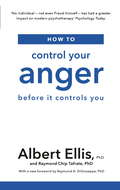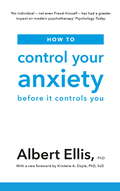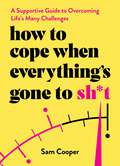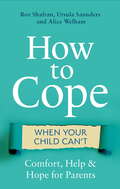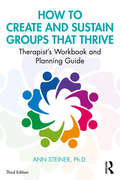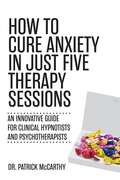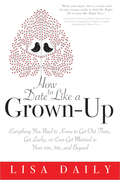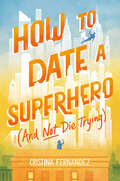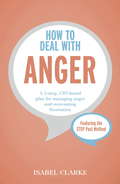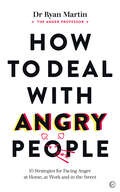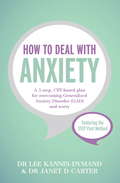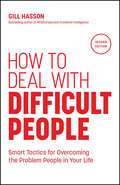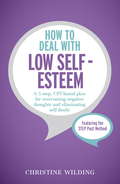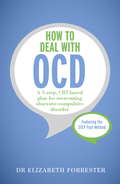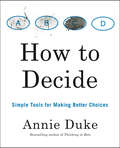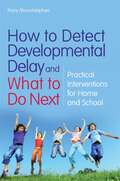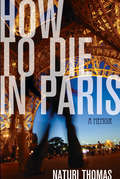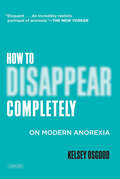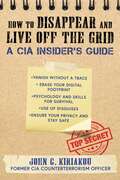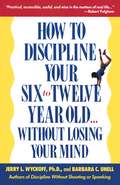- Table View
- List View
How to Control Your Anger: Before it Controls You
by Raymond Chip Tafrate Albert Ellis PhDAnger is universal. Unchecked, it can cause lasting damage in our lives: wrecked relationships, lost jobs, even serious disease. Yet in these increasingly stressful times, all of us have acted in anger - and often wished we hadn't. Is there a way that really works to solve problems and assert ourselves without being angry? The answer is a resounding yes, if you follow the breakthrough steps of Rational Emotive Behavior Therapy (REBT). This proven approach, developed by world renowned psychotherapist Dr. Albert Ellis, has withstood the test of time, helping countless people deal effectively with emotional problems. Using easy-to-master instructions and exercises, this classic book will show you how to apply REBT techniques to understand the roots and nature of your anger, and take control of and reduce angry reactions. Here you will discover: *The rational and irrational aspects of anger*Special insights into your self-angering beliefs*How to think, feel, and act your way out of anger*How to relax*How to accept yourself with your anger. . .and much more that will help you challenge and eliminate the anger that can frustrate success and happiness at home, at work, anywhere.
How to Control Your Anxiety: Before it Controls You
by Albert Ellis PhDFrom social anxiety to phobias to post-traumatic stress disorder, sources of anxiety in daily life are numerous, and can have a powerful impact on your future. By following the rules of Rational Emotive Behavior Therapy (REBT), created by world renowned therapist Dr. Albert Ellis, you can stop anxiety in its tracks if you will admit this important fact: Things and people do not make you anxious. You do. Your unrealistic expectations produce your needless anxiety. Yet not all anxiety is needless...Healthy anxiety can ward off dangers and make you aware of negative things that you can change. Unhealthy anxiety inhibits you from enjoying everyday activities and relationships, causes you to perform poorly, and blocks your creativity. Using the easy-to-master, proven precepts of REBT, this classic book not only helps you distinguish between healthy and unhealthy anxiety, but teaches you how to:*Understand and dispute the irrational beliefs that make you anxious*Use a variety of exercises, including rational coping self-statements, reframing, problem-solving methods, and Unconditional Self-Acceptance (USA), to control your anxiety*Apply over 200 maxims to control your anxious thinking as well as your bodily reactions to anxiety...and much more, including examples from dozens of cases Dr. Ellis treated successfully. Now you can overcome the crippling effects of anxiety-and increase your prospects for success, pleasure and happiness at home and in the workplace.
How to Cope When Everything's Gone to Sh*t: A Supportive Guide to Overcoming Life's Many Challenges
by Sam CooperPacked with helpful tips and kind words, this book will be your go-to guide to finding calm in a chaotic world. This valuable guide offers coping strategies for a range of anxieties, from work-related stress to concerns about the future of the planet. With the advice inside, you'll start to feel more confident and ready to take on any challenges.
How to Cope When Everything's Gone to Sh*t: A Supportive Guide to Overcoming Life's Many Challenges
by Sam CooperPacked with helpful tips and kind words, this book will be your go-to guide to finding calm in a chaotic world. This valuable guide offers coping strategies for a range of anxieties, from work-related stress to concerns about the future of the planet. With the advice inside, you'll start to feel more confident and ready to take on any challenges.
How to Cope When Your Child Can't: Comfort, Help and Hope for Parents
by Roz Shafran Ursula Saunders Alice WelhamParenting and caring for a child who is struggling to cope can be painful and stressful, and can make it very hard to enjoy life yourself. Feelings of blame, guilt, sorrow, despair, fear and frustration may be swirling around alongside a desperate desire to cure their pain.Although parenting a child who is experiencing difficulties is a common problem, we can feel desperately alone when it is happening to us. When someone we love is struggling - for whatever reason - we may become unhappy too. For countless parents and children there are problems with no easy solutions. However, that's where this book comes in. It aims to help understand for ourselves what we can and cannot do; to help us to accept any distress, worry, anxiety, sadness or loss of control in our situations; to see that we can tolerate these things; and to know that there are ways to move forward.This book is packed with stories from real parents, combined with information from psychological research. It will show you how you can manage to obtain comfort from knowing you are not alone, get help from resources and techniques that really work, and find hope that things can and do change for the better.
How to Cope When Your Child Can't: Comfort, Help and Hope for Parents
by Roz Shafran Ursula Saunders Alice WelhamParenting and caring for a child who is struggling to cope can be painful and stressful, and can make it very hard to enjoy life yourself. Feelings of blame, guilt, sorrow, despair, fear and frustration may be swirling around alongside a desperate desire to cure their pain.Although parenting a child who is experiencing difficulties is a common problem, we can feel desperately alone when it is happening to us. When someone we love is struggling - for whatever reason - we may become unhappy too. For countless parents and children there are problems with no easy solutions. However, that's where this book comes in. It aims to help understand for ourselves what we can and cannot do; to help us to accept any distress, worry, anxiety, sadness or loss of control in our situations; to see that we can tolerate these things; and to know that there are ways to move forward.This book is packed with stories from real parents, combined with information from psychological research. It will show you how you can manage to obtain comfort from knowing you are not alone, get help from resources and techniques that really work, and find hope that things can and do change for the better.
How to Create and Sustain Groups that Thrive: Therapist's Workbook and Planning Guide
by Ann SteinerHow to Create and Sustain Groups That Thrive is an accessible manual for group leaders of all kinds, from psychotherapy groups to discussion groups. This thoroughly updated third edition of the author’s popular group psychotherapy guide provides a wealth of tools for starting and maintaining groups, including sample group agreements, a screening and preparation system, and an innovative collaborative goal setting system. The book also discusses the importance of online ‘netiquette’ as well as an overview of diversity and inclusion concepts in group work, offering a range of modifiable leadership and facilitation interventions that can be tailored to meet the needs of specific groups. Specifically designed to help both seasoned group therapists and clinicians who find themselves leading groups, How to Create and Sustain Groups That Thrive is an easy-to-use, fully practical resource for a variety of mental health professionals.
How to Cure Anxiety in Just Five Therapy Sessions: An Innovative Guide for Clinical Hypnotists and Psychotherapists
by Patrick McCarthyThe purpose of this book is to carefully explain to therapists, who may have little or no experience with hypnosis, a simple therapeutic solution to anxiety and panic that often cures patients. My method works by addressing the answer to HOW we become anxious (the mechanisms that always exist) and not WHY we become anxious or WHAT makes us anxious. It is different than other methods because it essentially forgoes much if any history taking, which many patients enjoy as it so unexpected and different from any other therapists before. It focuses on the patient feeling understood rather than heard. Using this unorthodox method can transform your practice by quickly curing and relieving anxiety and panic in many patients.
How to Date Like a Grown-Up
by Lisa Daily"Witty and smart, this is a must-read for any woman ready to find Mr. Right. Or at least Mr. Right Now. " Christopher Hopkins, Oprah's Makeover Guy and author of Staging Your Comeback: A Complete Beauty Revival for Women Over 45 By the time you hit forty, you have a pretty good idea of what you want when it comes to dating, love, and romance. But how do you get it? HOW TO DATE LIKE A GROWN-UP will tell you everything you need to know to find the love you're looking for (even after a long marriage or other dating hiatus), how to get married (if that's what you're after), or how to just get lucky. Dating expert, bestselling author, and TV personality Lisa Daily (Daytime) uses her hilarious and compassionate voice to offer up realistic, counterintuitive advice that will help you finally find the relationship (and the guy) you deserve, including: Where (and how) to meet better men 5 easy tips to chat up any stranger What you may be doing to make yourself a magnet for losers How to deal with the pitfalls and fringe benefits of dating younger men Little-known secrets to dramatically improve your dating odds How to break it to your kids that you have a better social life than they do A foolproof way to find the best dating site for you How to face getting naked in front of someone new for the first time How to accommodate changes in your body (and the little blue pill) The one simple thing you can do in the bedroom that will make a man speed up his marriage proposal Why men are rushing to the altar, and why you might just want to wait Dating: It's Not Just For Kids Anymore
How to Date a Superhero (And Not Die Trying)
by Cristina FernandezA romantic coming-of-age story about growing up, falling in love, and surviving life—all set in the world of superheroes—from debut author Cristina Fernandez, proving that you don’t need a superpower to be the hero of your own origin story, perfect for fans of The Rest of Us Just Live Here and Renegades.Falling for a superhero is dangerous. You have to trust that they’ll catch you.Astrid isn’t a superhero, not like the ones she sees on the news, but she has something she thinks of as a small superpower: She has a perfect sense of time. And she’s not going to waste a single second.Her plan for college is clear—friends, classes, and extra-curriculars all carefully selected to get her into medical school.Until Max Martin, a nerdy boy from high school, crashes back into her life. Things with Max were never simple, and he doesn’t keep to her schedule. He disappears in the middle of dates and cancels last-minute with stupid excuses.When a supervillain breaks into her bedroom one night, Astrid has to face the facts: Her boyfriend, Max Martin, is a superhero. Double-majoring as a pre-med was hard, but now Astrid will have to balance a double-life. This wasn’t part of her plan.
How to Deal with Anger: A 5-step, CBT-based plan for managing anger and overcoming frustration
by Dr Isabel ClarkeYOUR FIRST STEP TO A LIFE FREE FROM ANGEREveryone feels angry from time to time, and anger is a natural and normal way to respond to the things in life that frustrate us. But it is all too easy to allow feelings of anger and displeasure to color your life and your relationships with other people. Managing these feelings is important, as apart from making you difficult to live with, anger has negative effects on your blood pressure and makes you more susceptible to heart attacks, depression and anxiety.A PRACTICAL AND SUPPORTIVE 5-STEP COURSE TO SET YOU FREE FROM ANGERBy picking this book up you've taken the first stride to a life free from anger. Using the STEP system - a structured, CBT-based approach that delivers both support and proven techniques for managing anger - you can begin to transform your daily life. Written by an expert author with many years of clinical experience, this book will help you get a better understanding of your anger and what keeps it going, tackle negative thoughts and behaviour, and progress to a healthier, happier outlook - without fear of setbacks or relapse.ABOUT THE SERIESEveryone feels overwhelmed sometimes. When that happens, you need clarity of thought and practical advice to progress beyond the problem. The How To Deal With series provides structured, CBT-based solutions from health professionals and top experts to help you deal with issues thoroughly, once and for all. Short, easy to read, and very reassuring, these books are your first step on a pathway to a happier future. They are perfect for self-directed use and are designed so that medical professionals can prescribe them to patients.
How to Deal with Angry People: 10 Strategies for Facing Anger at Home, at Work and in the Street
by Dr. Ryan MartinRyan Martin, aka Tiktok's "The Anger Professor" (162k followers), offers 10 highly effective, research-based strategies for coping with the anger you have to face, whether at home, at work, on the street or online.Whether the confrontations are taking place at home, at work or online, the emotional toll of dealing with an angry person day-in day-out can be huge. As we often can't cut ourselves off from these angry people (although terminating the relationship is an option that&’s explored), this book draws on the author's years of research and clinical practice to help readers manage potentially explosive situations for the best possible outcomes. The book:Reveals the psychological factors that underpin an angry personality (eg genetics, gender, other personality traits). Offers ten key strategies for dealing effectively with angry people, from figure out what you want from this person and know when to disengage to avoid character assaults and find ways to reach those who refuse to communicate.Provides case studies, fact boxes, tips and activities to support readers as they deal with the angry people in their lives.
How to Deal with Anxiety: A 5-step, CBT-based plan for overcoming generalized anxiety disorder (GAD) and worry
by Janet D Carter Lee Kannis-DymandEveryone feels anxious from time to time, and worry is a natural part of life. But it is all too common to allow concerns about our health, our security, our relationships or our place in the world to become a negative cycle and a burden. Anxiety gets called GAD when the worry is repetitive, becomes associated with a variety of emotional and physical symptoms, and begins to impact upon our ability to enjoy life. If these problems sound familiar to you, this book will provide you with practical help to deal with and overcome the problem.By picking this book up you've taken the first stride. Now, using the STEP system - a structured, CBT-based approach that delivers both support and proven techniques for beating anxiety - you can begin to transform your daily life. Written by an expert team with many years of clinical experience, this book will help you get a better understanding of your anxiety and what keeps it going, tackle negative thoughts and behaviour, and progress to a healthier, happier outlook - without fear of setbacks or relapse.
How to Deal with Anxiety: A 5-step, CBT-based plan for overcoming generalized anxiety disorder (GAD) and worry
by Janet D Carter Lee Kannis-DymandEveryone feels anxious from time to time, and worry is a natural part of life. But it is all too common to allow concerns about our health, our security, our relationships or our place in the world to become a negative cycle and a burden. Anxiety gets called GAD when the worry is repetitive, becomes associated with a variety of emotional and physical symptoms, and begins to impact upon our ability to enjoy life. If these problems sound familiar to you, this book will provide you with practical help to deal with and overcome the problem.By picking this book up you've taken the first stride. Now, using the STEP system - a structured, CBT-based approach that delivers both support and proven techniques for beating anxiety - you can begin to transform your daily life. Written by an expert team with many years of clinical experience, this book will help you get a better understanding of your anxiety and what keeps it going, tackle negative thoughts and behaviour, and progress to a healthier, happier outlook - without fear of setbacks or relapse.ABOUT THE SERIESEveryone feels overwhelmed sometimes. When that happens, you need clarity of thought and practical advice to progress beyond the problem. The How To Deal With series provides structured, CBT-based solutions from health professionals and top experts to help you deal with issues thoroughly, once and for all. Short, easy to read, and very reassuring, these books are your first step on a pathway to a happier future. They are perfect for self-directed use and are designed so that medical professionals can prescribe them to patients.
How to Deal with Difficult People: Smart Tactics for Overcoming the Problem People in Your Life
by Gill HassonDon't let problem people get to you! Whether it's a manager who keeps moving the goal posts, an uncooperative colleague, negative friend, or critical family member, some people are just plain hard to get along with. Often, your immediate response may be to shrink or sulk, become defensive or attack. But there are smarter moves to make when dealing with difficult people. This book explains how to cope with a range of situations with difficult people and to focus on what you can change. This book will help you to: Understand what makes difficult people tick and how best to handle them Learn ways to confidently stand up to others and resist the urge to attack back Develop strategies to calmly navigate emotionally-charged situations Deal with all kinds of difficult people — hostile, manipulative and the impossible Know when to choose your battles, and when to walk away Why let someone else's bad attitude ruin your day? This second edition of How to Deal With Difficult People arms you with all the tools and tactics you need to handle all kinds of people — to make your life less stressful and a great deal easier.
How to Deal with Low Self-Esteem: A 5-step, CBT-based plan for overcoming negative thoughts and eliminating self-doubt
by Christine WildingEveryone can identify with feelings of uncertainty. To worry about our status in the world and to fear that we are not living up to our potential is a common and understandable concern. But when our self-esteem becomes low our our estimation of ourselves becomes over-critical, it is all too common to let negative feelings become a burden. If this sound familiar to you, this book will provide you with practical help to deal with and overcome the problem.By picking this book up you've taken the first stride. Now, using the STEP system - a structured, CBT-based approach that delivers both support and proven techniques for defeating low self-esteem - you can begin to transform your daily life. Written by an expert author with many years of clinical experience, this book will help you get a better understanding of your sense of self, tackle negative thoughts and behaviour, and progress to a healthier, happier outlook - without fear of setbacks or relapse.ABOUT THE SERIESEveryone feels overwhelmed sometimes. When that happens, you need clarity of thought and practical advice to progress beyond the problem. The How To Deal With series provides structured, CBT-based solutions from health professionals and top experts to help you deal with issues thoroughly, once and for all. Short, easy to read, and very reassuring, these books are your first step on a pathway to a happier future. They are perfect for self-directed use and are designed so that medical professionals can prescribe them to patients.
How to Deal with OCD: A 5-step, CBT-based plan for overcoming obsessive-compulsive disorder
by Elizabeth ForresterOCD, or obsessive compulsive disorder, is a common and difficult condition characterised by intrusive thoughts which produce worry and the compulsive desire to carry out repetitive behaviours aimed at reducing anxiety. OCD symptoms can range from mild to severe, and can really impact upon our mental health and ability to enjoy life. Recovery from OCD is possible, however.By picking this book up you've taken the first stride. Now, using the STEP system - a structured, CBT-based approach that delivers both support and proven techniques for combating obsessive thoughts - you can begin to transform your daily life. Written by an expert author with many years of clinical experience, this book will help you get a better understanding of your OCD, take practical steps to progress to a healthier, happier outlook - without fear of setbacks or relapse.ABOUT THE SERIESEveryone feels overwhelmed sometimes. When that happens, you need clarity of thought and practical advice to progress beyond the problem. The How To Deal With series provides structured, CBT-based solutions from health professionals and top experts to help you deal with issues thoroughly, once and for all. Short, easy to read, and very reassuring, these books are your first step on a pathway to a happier future. They are perfect for self-directed use and are designed so that medical professionals can prescribe them to patients.
How to Decide: Simple Tools for Making Better Choices
by Annie DukeThrough a blend of compelling exercises, illustrations, and stories, the bestselling author of Thinking in Bets will train you to combat your own biases, address your weaknesses, and help you become a better and more confident decision-maker.What do you do when you're faced with a big decision? If you're like most people, you probably make a pro and con list, spend a lot of time obsessing about decisions that didn't work out, get caught in analysis paralysis, endlessly seek other people's opinions to find just that little bit of extra information that might make you sure, and finally go with your gut. What if there was a better way to make quality decisions so you can think clearly, feel more confident, second-guess yourself less, and ultimately be more decisive and be more productive? Making good decisions doesn't have to be a series of endless guesswork. Rather, it's a teachable skill that anyone can sharpen. In How to Decide, bestselling author Annie Duke and former professional poker player lays out a series of tools anyone can use to make better decisions. You'll learn: • To identify and dismantle hidden biases. • To extract the highest quality feedback from those whose advice you seek. • To more accurately identify the influence of luck in the outcome of your decisions. • When to decide fast, when to decide slow, and when to decide in advance. • To make decisions that more effectively help you to realize your goals and live your values.Through interactive exercises and engaging thought experiments, this book helps you analyze key decisions you've made in the past and troubleshoot those you're making in the future. Whether you're picking investments, evaluating a job offer, or trying to figure out your romantic life, How to Decide is the key to happier outcomes and fewer regrets.
How to Design and Report Experiments
by Andy Field Dr Graham J HoleHow to Design and Report Experiments is the perfect textbook and guide to the often bewildering world of experimental design and statistics. It provides a complete map of the entire process beginning with how to get ideas about research, how to refine your research question and the actual design of the experiment, leading on to statistical procedure and assistance with writing up of results. While many books look at the fundamentals of doing successful experiments and include good coverage of statistical techniques, this book very importantly considers the process in chronological order with specific attention given to effective design in the context of likely methods needed and expected results. Without full assessment of these aspects, the experience and results may not end up being as positive as one might have hoped. Ample coverage is then also provided of statistical data analysis, a hazardous journey in itself, and the reporting of findings, with numerous examples and helpful tips of common downfalls throughout. Combining light humour, empathy with solid practical guidance to ensure a positive experience overall, Designing and Reporting Experiments will be essential reading for students in psychology and those in cognate disciplines with an experimental focus or content in research methods courses.
How to Detect Developmental Delay and What to Do Next: Practical Interventions for Home and School
by Mary Mountstephen Barbara Pheloung Lucy Smith Agnieszka Olechowska Elvie BrownIf a child is not meeting expected milestones it can be a source of great anxiety for parents and teachers. This forthright guide offers practical advice on how to recognize the signs of developmental delay, address difficulties effectively, and help the child to flourish. Mary Mountstephen presents a practical approach to dealing with developmental delay, equipping readers with the knowledge, understanding and tools to tackle problems successfully. By clearly explaining how children develop, drawing on the expertise of a number of specialists in the field and detailing straightforward interventions, the author enables parents and teachers to identify a wide range of problems and empowers them with the information they need to take action. Concise and accessible, this book provides a wealth of useful advice on how to address developmental delay, and will prove invaluable to parents, teachers and other professionals working with children.
How to Develop Your Children's Creativity
by Reynold BeanA guide to help parents teach their children to become more flexible and adaptive thinkers in an ever-changing world.
How to Die in Paris: A Memoir
by Naturi ThomasHow to Die in Parisis an edgy, poetic, often darkly comic, memoir of a young middle-class black woman who escapes a tortured past in New York to pursue a new life in Europe-only to find herself broke, desperate, and contemplating suicide on the streets of Paris. Penniless, scared, and hoping for rescue, Thomas turns to a series of unlikely male suitors: an impoverished Italian who exposes her to the reality of immigrant struggle, a fast-talking squatter who lures her into Paris’s street youth culture, and a beautiful Tunisian who takes her home . . . only to introduce her to a world of pain. Each encounter awakens in her memories from her childhood-memories of the abuse and racism she experienced at the hands of her mother-and forces her to confront the darkness in her past, even as she struggles to survive in the present. Though the trials she faces in Paris are often harrowing, Thomas is anything but self-pitying, often culling humor from gritty moments, and she finds goodness in the small blessings that come her way: a library that offers warmth and escape, a sandwich abandoned in a phone booth, the generosity of strangers, and especially, the wonder of Paris itself. Ultimately, being homeless in the City of Light frees her of the denial and defenses that have been holding her back all her life-revealing a broader world too beautiful to leave.
How to Disappear Completely: On Modern Anorexia
by Kelsey OsgoodAt fourteen, Kelsey Osgood became fascinated by the stories of women who starved themselves. She devoured their memoirs and magazine articles, committing the most salacious details to memory to learn what it would take to be the very best anorexic. When she was hospitalized at fifteen, she found herself in an existential wormhole: how can one suffer from something one has actively sought out? With attuned storytelling and unflinching introspection, Kelsey Osgood unpacks the modern myths of anorexia as she chronicles her own rehabilitation. How to Disappear Completely is a brave, candid and emotionally wrenching memoir that explores the physical, internal, and social ramifications of eating disorders.
How to Disappear and Live Off the Grid: A CIA Insider's Guide
by John KiriakouWith an experienced CIA officer as your teacher, you&’ll gain the knowledge and necessary tools to protect yourself and the ones you love.No matter where we go, we leave tracks and clues of our existence without even knowing. Our electronic footprint becomes our invisible trail. In this day in age where the world seems to be at our fingertips and social media plays a huge role in our daily lives, it&’s hard not to leave part of our digital selves for others to find.Whether you&’re fascinated by the idea of disappearing, want to erase your digital footprint, or simply concerned about your safety and privacy, knowing how to become invisible is a survival skill that will come in handy.Through the easy-to-follow instructions, tips, tricks, and professional anecdotes in How to Disappear and Live off the Grid: A CIA Insider's Guide, you&’ll learn to vanish without a trace from John Kiriakou, a former CIA counterterrorism officer and senior investigator for the Senate Foreign Relations Committee responsible for the capture of Abu Zubaydah.
How to Discipline Your 6-12
by Barbara C. Unell Jerry WyckoffDiscipline Without Shouting Or Spanking became a best-seller by proving practical, effective advice on common behavioral problems to parents of children under six. Here the authors adapt their winning formula for older youngsters.From the Trade Paperback edition.
